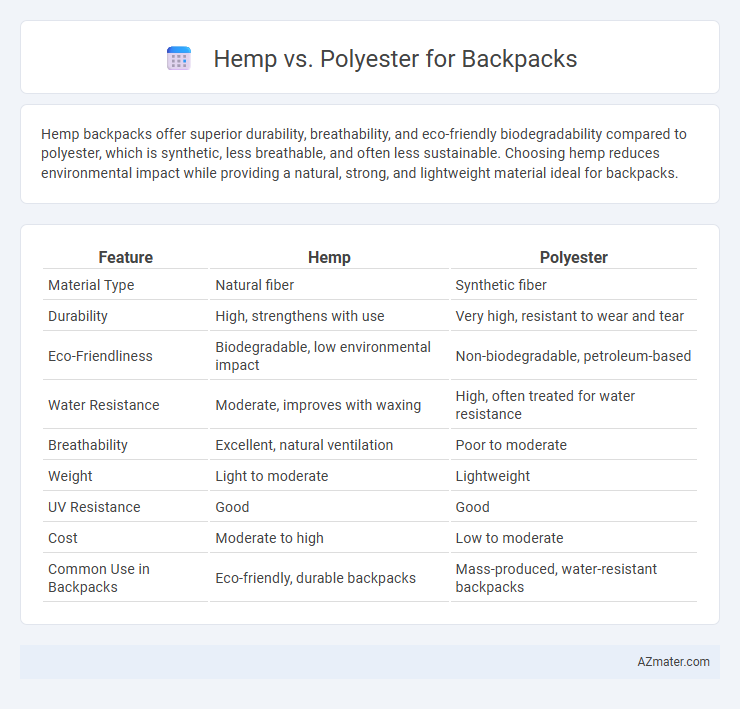Hemp backpacks offer superior durability, breathability, and eco-friendly biodegradability compared to polyester, which is synthetic, less breathable, and often less sustainable. Choosing hemp reduces environmental impact while providing a natural, strong, and lightweight material ideal for backpacks.
Table of Comparison
| Feature | Hemp | Polyester |
|---|---|---|
| Material Type | Natural fiber | Synthetic fiber |
| Durability | High, strengthens with use | Very high, resistant to wear and tear |
| Eco-Friendliness | Biodegradable, low environmental impact | Non-biodegradable, petroleum-based |
| Water Resistance | Moderate, improves with waxing | High, often treated for water resistance |
| Breathability | Excellent, natural ventilation | Poor to moderate |
| Weight | Light to moderate | Lightweight |
| UV Resistance | Good | Good |
| Cost | Moderate to high | Low to moderate |
| Common Use in Backpacks | Eco-friendly, durable backpacks | Mass-produced, water-resistant backpacks |
Introduction: Why Material Choice Matters for Backpacks
Choosing the right material for backpacks significantly affects durability, comfort, and environmental impact. Hemp offers superior breathability, natural resistance to wear, and eco-friendly benefits due to its biodegradability and low water use during cultivation. Polyester, known for its strength and water resistance, often involves synthetic production processes that contribute to higher carbon emissions and less sustainability.
Overview of Hemp and Polyester Fabrics
Hemp fabric is derived from the hemp plant, known for its durability, breathability, and natural resistance to mold and UV rays, making it an eco-friendly choice. Polyester is a synthetic fiber produced from petrochemicals, valued for its strength, water resistance, and quick-drying properties, but it lacks biodegradability. While hemp offers sustainability and biodegradability, polyester provides superior abrasion resistance and lower moisture absorption, influencing their use in backpack manufacturing.
Environmental Impact: Hemp vs Polyester
Hemp backpacks have a significantly lower environmental impact compared to polyester, as hemp is a natural, biodegradable fiber that requires less water, pesticides, and synthetic fertilizers during cultivation. Polyester, a synthetic material derived from petroleum, is energy-intensive to produce and contributes to microplastic pollution when washed. Choosing hemp over polyester supports sustainable agriculture and reduces plastic waste in ecosystems.
Durability and Longevity Comparison
Hemp backpacks exhibit exceptional durability due to their natural fiber strength, resisting tears and abrasions better than many synthetic materials. Polyester backpacks, while water-resistant and quick-drying, tend to degrade faster under prolonged UV exposure and heavy wear. Hemp's biodegradability combined with its robust fiber structure ensures longer lifespan and sustainability compared to polyester alternatives.
Water Resistance and Weather Performance
Hemp fibers offer natural water resistance due to their dense structure and grow more durable with exposure to moisture, making hemp backpacks suitable for moderate weather conditions. Polyester, a synthetic fabric, excels in water resistance and quick drying, providing superior protection against heavy rain and prolonged damp environments. While polyester backpacks often feature coatings for enhanced waterproofing, untreated hemp still provides breathable, eco-friendly weather performance with natural mildew resistance.
Breathability and Comfort Factors
Hemp offers superior breathability compared to polyester due to its natural fibers that allow better air circulation, reducing moisture buildup and keeping the backpack's contents fresh. Polyester, while durable and water-resistant, tends to trap heat and sweat, leading to less comfort during extended wear. The comfort factor in hemp backpacks is enhanced by its softness and ability to regulate temperature, making it ideal for outdoor activities and hot climates.
Weight and Portability Considerations
Hemp backpacks are generally lighter than polyester ones, offering enhanced portability for everyday use and outdoor activities. Hemp fibers provide natural breathability and durability while maintaining a low weight, reducing strain during long trips. Polyester backpacks, although slightly heavier, offer water resistance and quick drying properties but compromise on breathability and can feel bulkier when carried.
Cost Analysis: Hemp vs Polyester Backpacks
Hemp backpacks generally have a higher upfront cost compared to polyester due to sustainable farming practices and eco-friendly processing techniques. Polyester backpacks offer lower manufacturing expenses resulting in more budget-friendly prices but often lack the environmental benefits present in hemp products. Over time, the durability and biodegradability of hemp can lead to cost savings in replacement and disposal compared to synthetic polyester backpacks.
Style and Aesthetic Versatility
Hemp backpacks offer a natural, earthy aesthetic with a textured, matte finish that appeals to eco-conscious consumers seeking timeless style. Polyester backpacks provide sleek, smooth surfaces available in vibrant colors and diverse patterns, catering to modern, urban fashion trends. The choice between hemp and polyester impacts the backpack's visual appeal and versatility, with hemp emphasizing rustic charm and polyester highlighting bold, contemporary design.
Which Material Is Best for Your Backpack Needs?
Hemp offers a sustainable, durable, and naturally water-resistant option for backpacks, making it ideal for eco-conscious users who prioritize longevity and environmental impact. Polyester provides a lightweight, affordable, and highly water-resistant material, suitable for those seeking budget-friendly backpacks with strong resistance to wear and tear. The best material depends on whether sustainability, durability, or cost-efficiency aligns most closely with your backpack needs.

Infographic: Hemp vs Polyester for Backpack
 azmater.com
azmater.com